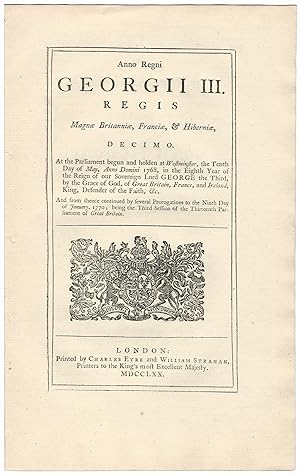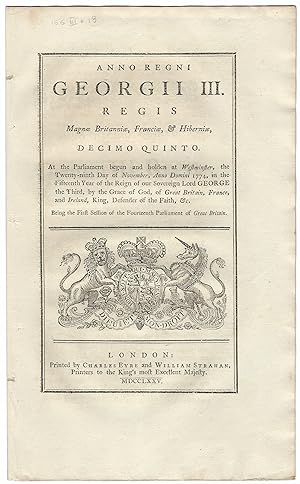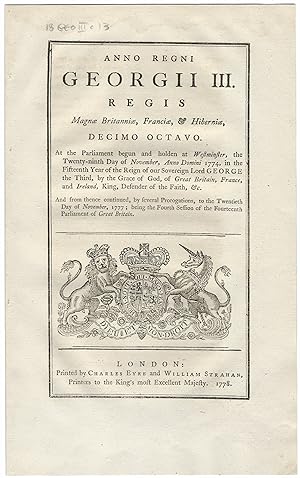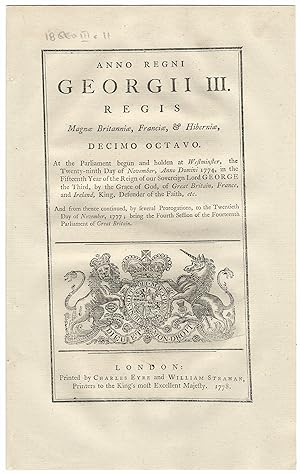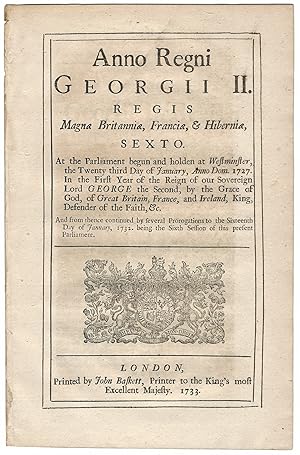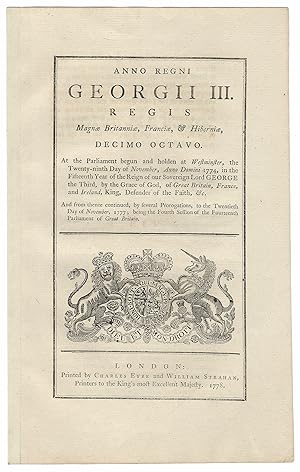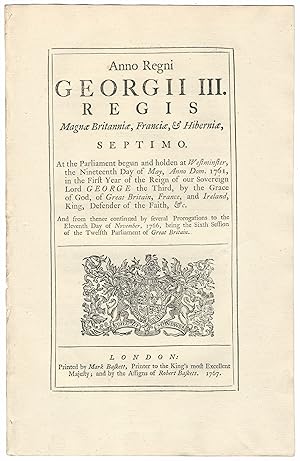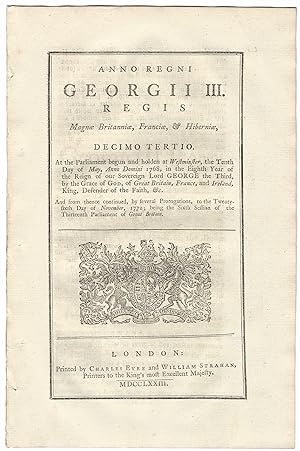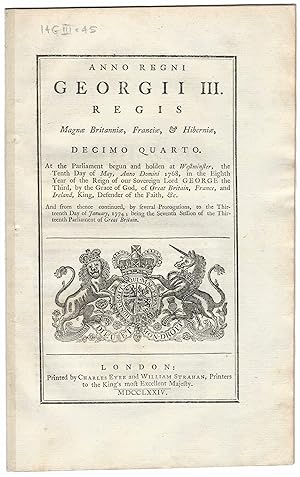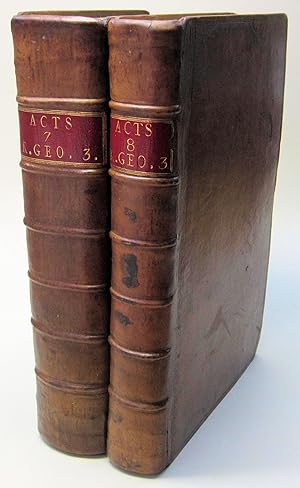american revolution great britain parliament (16 résultats)
CommentairesFiltres de recherche
Type d'article
- Tous les types de produits
- Livres (16)
- Magazines & Périodiques (Aucun autre résultat ne correspond à ces critères)
- Bandes dessinées (Aucun autre résultat ne correspond à ces critères)
- Partitions de musique (Aucun autre résultat ne correspond à ces critères)
- Art, Affiches et Gravures (Aucun autre résultat ne correspond à ces critères)
- Photographies (Aucun autre résultat ne correspond à ces critères)
- Cartes (Aucun autre résultat ne correspond à ces critères)
- Manuscrits & Papiers anciens (Aucun autre résultat ne correspond à ces critères)
Etat En savoir plus
- Neuf (Aucun autre résultat ne correspond à ces critères)
- Comme neuf, Très bon ou Bon (1)
- Assez bon ou satisfaisant (15)
- Moyen ou mauvais (Aucun autre résultat ne correspond à ces critères)
- Conformément à la description (Aucun autre résultat ne correspond à ces critères)
Particularités
- Ed. originale (16)
- Signé (Aucun autre résultat ne correspond à ces critères)
- Jaquette (Aucun autre résultat ne correspond à ces critères)
- Avec images (16)
- Sans impressions à la demande (16)
Langue (1)
Prix
- Tous les prix
- Moins de EUR 20 (Aucun autre résultat ne correspond à ces critères)
- EUR 20 à EUR 45 (Aucun autre résultat ne correspond à ces critères)
- Plus de EUR 45
Livraison gratuite
- Livraison gratuite à destination de France (Aucun autre résultat ne correspond à ces critères)
Pays
Evaluation du vendeur
-
TOWNSHEND REVENUE ACT AMENDMENT (1770). An Act to repeal so much of an Act made in the Seventh Year of His present Majesty's Reign, intituled, An Act for granting certain Duties in the British Colonies and Plantations in America; for allowing a Drawback of the Duties of Customs upon the Exportation, from this Kingdom, of Coffee and Cocoa Nuts, of the Produce of the said Colonies or Plantations; for discontinuing the Drawbacks payable on China Earthen Ware exported to America; and for more effectually preventing the clandestine Running of Goods in the said Colonies and Plantations, as relates to the Duties upon Glass, Red Lead, White Lead, Painters Colours, Paper, Paste Boards, Mill Boards and Scale Boards .
Edité par London: Charles Eyre and William Strahan, 1770
Vendeur : Bob Gaba, Victoria, BC, Canada
Edition originale
EUR 438,84
Autre deviseEUR 17,04 expédition depuis Canada vers FranceQuantité disponible : 1 disponible(s)
Ajouter au panierSoft cover. Etat : Very Good. 1st Edition. Folio (12 inches). 10 George III, Chapter 17. General title leaf + pages 331-334. Woodcut Royal coat of arms and decorative initial. Text in Black Letter. Neatly extracted from a bound volume and expertly mended. In 1767 and 1768, a series of five parliamentary acts were passed by the British government to raise revenue from the American colonies to pay the salaries of governors and judges, create a more effective means of enforcing compliance with trade regulations, and punish the colony of New York for failing to comply with the Quartering Act, 1765. The legislation intended to re-establish the precedent that the British Parliament had the right to tax the American colonies, in keeping with the principles of mercantilism. The unpopular acts became known as the Townshend Acts, after Charles Townshend, Chancellor of the Exchequer and architect of the legislation. This Act, known as the Revenue Act Amendment, 1770 repealed most of the Revenue Act, 1767 (the second Townshend Act), but the duty on tea remained in place to demonstrate that Parliament held the right to tax its colonists in accordance with the Declaratory Act, 1765.
-
SOUTHERN COLONIES RESTRAINING ACT (1775). An Act to restrain the Trade and Commerce of the Colonies of New Jersey, Pennsylvania, Maryland, Virginia and South Carolina, to Great Britain, Ireland and the British Islands in the West Indies, under certain Conditions and Limitations. Also known as the SECOND RESTRAINING ACT (1775).
Edité par London: Charles Eyre and William Strahan, 1775
Vendeur : Bob Gaba, Victoria, BC, Canada
Edition originale
EUR 570,50
Autre deviseEUR 17,04 expédition depuis Canada vers FranceQuantité disponible : 1 disponible(s)
Ajouter au panierSoft cover. Etat : Very Good. 1st Edition. Folio (12.25 inches). 15 George III, Chapter 18. General title leaf + pages 463-472. Woodcut Royal coat of arms, headband, and decorative initial. Text in Black Letter. Neatly extracted from a bound volume and expertly mended. The Intolerable Acts of 1774 seriously damaged relations between the American colonies and the British government, and before long the colonists began to boycott British good and organize themselves into militia units independent of British control. In response, the British Parliament passed the New England Restraining Act in 1775 (also known as the First Restraining Act, 1775), which limited New England trade to Great Britain, Ireland and the British West Indies only. When news reached London that other American colonies were following suit, this Act, known as the Southern Colonies Restraining Act, 1775 (or Second Restraining Act, 1775) was swiftly issued to include New Jersey, Pennsylvania, Maryland, Virginia and South Carolina in the trade restrictions. New York, Delaware, North Carolina, and Georgia were not included because the British government had mistakenly believed that those colonies were opposed to the colonial boycott.
-
TRUCE WITH AMERICA ACT (1782). An Act to enable His Majesty to conclude a Peace or Truce with certain Colonies in North America therein mentioned.
Edité par London: Charles Eyre and William Strahan, 1782
Vendeur : Bob Gaba, Victoria, BC, Canada
Edition originale
EUR 3 071,90
Autre deviseEUR 17,04 expédition depuis Canada vers FranceQuantité disponible : 1 disponible(s)
Ajouter au panierSoft cover. Etat : Very Good. 1st Edition. A WILLINGNESS FOR PEACE. Folio (12 inches). 22 George III, Chapter 46. General title leaf + pages 787-788. Royal coat of arms, headpiece ornament, and factotum initial. Text in Black Letter. Neatly extracted from a bound volume and expertly mended. By the spring of 1782, it was clear that King George III and Parliament were firmly on the path of reconciliation with the American colonies. The British military faced many difficulties and setbacks, and the American colonists maintained a much more formidable resistance than initially thought. The war was also very costly for the British in terms of manpower and money, and support from the British public soon began to wane. By the middle of June, the Truce with America Act, 1782 had gained the Royal Assent. The Act stated that it was: / / essential to the Interests, Welfare, and Prosperity of Great Britain, and of the Colonies or Plantations of New Hampshire, Massachusets [sic] Bay, Rhode Island, Connecticut, New York, New Jersey, Pensylvania [sic], the Three Lower Counties on Delaware, Maryland, Virginia, North Carolina, South Carolina, and Georgia, in North America, that Peace, Intercourse, Trade, and Commerce, should be restored between them: Wherefore, and for a full Manifestation of the earnest Wish and Desire of His Majesty and his Parliament to put an End to the Calamities of War it shall and may be lawful for his Majesty to treat, consult of, agree, and conclude, with any Commissioner or Commissioners, named or to be named by the said Colonies or Plantations, or any of them respectively, or with any Body or Bodies Corporate or Politick, or any Assembly or Assemblies, or Description of Men, or any Person or Persons whatsoever, a Peace or a Truce with the said Colonies or Plantations, or any of them, or any Part or Parts thereof / / . The Act also declared that the operation and effect of any prior Acts of Parliament, or parts thereof, relating to all or any of the American colonies or plantations, were to be repealed, annulled, made void, or suspended in order to conclude and establish a peace or truce. The Act paved the way for the signing of the Treaty of Paris, 1783 (on 3 September 1783) which recognized the independence of the United States of America and established a boundary between the United States and British North America.
-
EXCHANGE OF AMERICAN PRISONERS ACT (1782). An Act for the better detaining, and more easy Exchange, of American Prisoners brought into Great Britain.
Edité par London: Charles Eyre and William Strahan, 1782
Vendeur : Bob Gaba, Victoria, BC, Canada
Edition originale
EUR 2 194,22
Autre deviseEUR 17,04 expédition depuis Canada vers FranceQuantité disponible : 1 disponible(s)
Ajouter au panierSoft cover. Etat : Very Good. 1st Edition. CONDITIONS FOR PRISONER EXCHANGE. Folio (12 inches). 22 George III, Chapter 10. General title leaf + pages 327-328. Royal coat of arms, headpiece ornament, and factotum initial. Text in Black Letter. Neatly extracted from a bound volume and expertly mended. By means of the Exchange of American Prisoners Act, 1782 Parliament addressed the legality of the continued detention of American prisoners brought into Great Britain. The Act declared that it was lawful: / / during the Continuance of the present hostilities, to hold and detain in such Prisons or Places within Great Britain as Prisoners of War, all Natives or Inhabitants of the Thirteen revolted Colonies not at His Majesty's Peace, who have been, or shall be, taken by Sea or Land. / / . It likewise authorized: / / His Majesty to discharge any Person or Persons so taken and detained as Prisoner or Prisoners of War, either absolutely, or upon such Conditions, and with such Limitations, or for such a Time, as His Majesty shall deem proper; as also to authorise any Commissioner or Commissioners to discharge or exchange all and every Person or Persons as aforesaid, according to the Custom and Usage of War, and the Law of Nations; Regard being had in the said Exchanges relative to Officers in His Majesty's Service, whether the said Officers have been made Prisoners in America or elsewhere, to the Rank of the said Prisoners, and Length of Time since they have been taken: And the Detention, Enlargement, or Exchange aforesaid, shall be good and valid, any Warrant of Commitment, or Cause therein expressed, or any Law, Custom, or Usage, to the contrary notwithstanding / / . Shortly after this Act received Royal Assent on 25 March 1782, peace negotiations began in Paris, and the British Crown moved to arrange a general prisoner exchange. By the summer of 1782, British officials acknowledged that American independence should be recognized, and in November the two sides agreed to preliminary articles of peace that formally recognized an independent United States of America and called for the freeing of all prisoners from both sides.
-
HABEAS CORPUS SUSPENSION (IN AMERICA) ACT (1777). An Act to impower His Majesty to secure and detain Persons charged with, or suspected of, the Crime of High Treason, committed in any of His Majesty's Colonies or Plantations in America, or on the High Seas, or the Crime of Piracy. TOGETHER WITH: 5 Continuation Acts (1778-1782).
Edité par London: Charles Eyre and William Strahan, 1777
Vendeur : Bob Gaba, Victoria, BC, Canada
Edition originale
EUR 3 949,59
Autre deviseEUR 17,04 expédition depuis Canada vers FranceQuantité disponible : 1 disponible(s)
Ajouter au panierSoft cover. Etat : Very Good. 1st Edition. TREASON AND PIRACY IN AMERICA AND THE SUSPENSION OF HABEAS CORPUS. Total of 6 Acts (1777-1782). Folio (12 to 12.5 inches). 17 George III, Chapter 9. General title leaf + pages 311-312. WITH: 18 George III, Chapter 1. General title leaf + pages 3-4. WITH: 19 George III, Chapter 1. General title leaf + pages 3-4. WITH: 20 George III, Chapter 5. General title leaf + pages 167-168. WITH: 21 George III, Chapter 2. General title leaf + pages 11-12. WITH: 22 George III, Chapter 1. General title leaf + pages 3-4. Royal coats of arms, headpiece ornaments, and factotum initials. Text in black letter. Neatly extracted from bound volumes and expertly mended. As the American colonies became fully involved with the revolutionary war, King George III proclaimed that the colonies were in a state of open defiance and rebellion, and ordered that martial law be imposed. In order to legitimize the preventative detention of captured American soldiers, Parliament enacted the Habeas Corpus Suspension (in America) Act, 1777. By suspending the right of habeas corpus, which normally guaranteed a person the right to be brought before a court to determine the legality of detention, the Act granted the British authorities the power to detain and incarcerate individuals charged or suspected of high treason in the colonies or piracy on the high seas, without bail or trial: / / Whereas a Rebellion and War have been openly and traiterously levied and carried on in certain of His Majesty's Colonies and Plantations in America, and Acts of Treason and Piracy have been committed on the High Seas, and upon the Ships and Goods of His Majesty's Subjects, and many Persons have been seised and taken, who are expressly charged or strongly suspected of such Treasons and Felonies, and many more such Persons may be hereafter so seised and taken: be it therefore enacted by the Kings most Excellent Majesty, by and with the Advice and Consent of the Lords Spiritual and temporal, and Commons, That all and every Person or Persons who are or shall be charged with or suspected of the Crime of High Treason and who have been, or shall be committed by any Magistrate having competent Authority in that Behalf, to the Common Gaol, or other Place of Confinement shall and may be thereupon secured and detained in safe Custody, without Bail or Mainprize / / . The Habeas Corpus Suspension (in America) Act, 1777 made it explicit that the purpose of the legislation was to permit the detention of American prisoners of war who, under the prevailing circumstances of insurrection, were considered to be traitors or pirates and therefore would be treated according to the law of nations rather than domestic criminal law. In addition, special provisions were made to incarcerate the prisoners of war in special places of confinement instead of common jails. The Act continued in force until 1 January 1778. The Habeas Corpus Suspension (in America) Act, 1777 was extended five times during the American Revolution, in 1778, 1779, 1780, 1781, and 1782, each continuing the legislation to be in force until 1 January of the following year. In all, the entire span of its legal effect ran from 20 February 1777 to 1 January 1783. A rare and complete set of the habeas corpus suspension legislation issued during the American Revolution. For a complete description of all six Acts, please see image.
-
PRIVATEERS ACT (1777). An Act for enabling the Commissioners for executing the Office of Lord High Admiral of Great Britain, to grant Commissions to the Commanders of Private Ships and Vessels, employed in Trade, or retained in His Majesty's Service, to take and make Prize of all such Ships and Vessels, and their Cargoes, as are therein mentioned, for a limited Time.
Edité par London: Charles Eyre and William Strahan, 1777
Vendeur : Bob Gaba, Victoria, BC, Canada
Edition originale
EUR 1 272,65
Autre deviseEUR 17,04 expédition depuis Canada vers FranceQuantité disponible : 1 disponible(s)
Ajouter au panierSoft cover. Etat : Very Good. 1st Edition. AUTHORIZATION TO TAKE AND MAKE PRIZES OF REBEL SHIPS AND CARGOES. Folio (12.5 inches). 17 George III, Chapter 7. General title leaf + pages 283-298. Royal coat of arms, headpiece ornament, and factotum initial. Text in Black Letter. Neatly extracted from a bound volume. The Prohibitory Act, 1776 (16 George III, Chapter 5), which banned all trade between Great Britain and the American colonies, was followed up by the Privateers Act, 1777 which empowered the British Admiralty to authorize commanders of British vessels (including those privately owner, involved in trade, or operating in official military service) to seize enemy ships owned and operated by American colonists and confiscate their cargoes. The Privateers Act, 1777 empowered privateers to participate in naval warfare, seize and lay claim to the vessels and cargo they captured, and divide up the booty among the crew (as adjudged by the Admiralty Courts). The law played a significant role in helping to disrupt colonial trade and assist with the war effort. The role of privateers became even more important in 1778 when France joined the war effort and used its comparatively large naval forces to help the American colonies in their struggle with Britain. The involvement of large-scale French fleets caused Britain to seriously consider the possibility of invasion or loss of its West Indian and Asian colonial holdings which were far more profitable and valuable to Britain than the thirteen colonies. British fears increased in 1779 when Spain joined the war and the Royal Navy was further stressed to maintain its fighting forces, protect trade, defend the home islands, and protect its colonial possessions.
-
MUTINY AND DESERTION (IN AMERICA) ACT (1775). An Act to amend and render more effectual in His Majesty's Dominions in America an Act, passed in the present Session of Parliament, intituled, An Act for punishing Mutiny and Desertion, and for the better Payment of the Army and their Quarters, and for extending the Provisions of the said Act to His Majesty's Marine Forces in America. TOGETHER WITH: 1 Continuation Act (1776).
Edité par London: Charles Eyre and William Strahan, 1775
Vendeur : Bob Gaba, Victoria, BC, Canada
Edition originale
EUR 1 272,65
Autre deviseEUR 17,04 expédition depuis Canada vers FranceQuantité disponible : 1 disponible(s)
Ajouter au panierSoft cover. Etat : Very Good. 1st Edition. QUARTERING OFFICERS AND SOLDIERS IN THE AMERICAN COLONIES. 2 Acts (1775 and 1776). (1) An Act to amend and render more effectual in His Majesty's Dominions in America an Act, passed in the present Session of Parliament, intituled, An Act for punishing Mutiny and Desertion, and for the better Payment of the Army and their Quarters, and for extending the Provisions of the said Act to His Majesty's Marine Forces in America. Folio (12 inches). 15 George III, Chapter 15 (1775). General title leaf + pages 383-406. (2) An Act to continue an Act made in the last Session of Parliament, intituled, An Act to amend and render more effectual in His Majesty's Dominions in America an Act, passed in the present Session of Parliament, intituled, "An Act for punishing Mutiny Desertion, and for the better Payment of the Army and their Quarters;" and for extending the Provisions of the said Act to His Majesty's Marine Forces in America. Folio (12 inches). 16 George III, Chapter 11 (1776). General title leaf + pages 335-336. Royal coats of arms, headpiece ornament, and factotum initial. Text in Black Letter. Light tide mark along upper margins. Both Acts have been neatly extracted from bound volumes and expertly mended. The Mutiny and Desertion (in America) Act, 1775 was a modified version of the Mutiny and Desertion Act passed annually by Parliament to govern, regulate, provision, and fund the activities of the British armed forces. Given the unrest in the American colonies, the legislation was tailored to assist with the circumstances confronting the forces stationed in the colonies. The Mutiny and Desertion (in America) Act, 1775 addressed the sensitive and almost universally abhorred issue of quartering British troops in the colonies. In the absence of sufficient means to quarter officers and soldiers in the barracks available to them, they were to be quartered and billeted in inns, livery stables, alehouses, victualling houses, and public alehouses by authority of the governor and council of each respective colony (or their assign). If additional shelter was required, suitable uninhabited houses, outbuildings, barns, or other buildings could be necessary to secure. Details on accommodation, food, drink and expenses were outlined in detail, as were penalties for persons harbouring deserters, or buying soldiers arms, clothes, or other accoutrements. The Mutiny and Desertion (in America) Act, 1775 was effective as of 24 March 1775, and was to last no more than a period of two years. On 19 April 1775, less than a month after the Act became valid, the first shots of the American Revolution were fired at Lexington and Concord in Massachusetts. The following year, in 1775, with the war well under way, it was deemed necessary to extend the 1775 Act for a further term. Thus, the Mutiny and Desertion (in America) Act, 1776 (designed to continue the legislation until 24 March 1778) received the Royal Assent on 22 March 1776. Shortly thereafter, on 4 July 1776, the Declaration of Independence was unanimously ratified by the Second Continental Congress composed of delegates from each of the Thirteen Colonies which, in itself, was an act of high treason against the British Crown.
-
BRITISH LEGISLATION THAT CAUSED THE AMERICAN WAR OF INDEPENDENCE. A Collection of 125 Parliamentary Acts from the period 1764 to 1797. Includes the SUGAR ACTS, STAMP ACTS, DECLARATORY ACT, QUARTERING ACTS, TOWNSHEND ACTS, TEA ACT, INTOLERABLE ACTS, RESTRAINING ACTS, PROHIBITORY ACT, PROPERTY and SHIP SEIZURE ACTS, CONCILIATORY ACTS, PRISONER ACT, TRUCE ACT, and others related to WARTIME ACTIVITIES, TRADE, COMMERCE, and CRITICAL DOMESTIC ISSUES.
Edité par London: Mark Baskett and the Assigns of Robert Baskett, Charles Eyre and William Strahan, C. Eyre and the Executors of W. Strahan, Charles Eyre and Andrew Strahan, and George Eyre and Andrew Strahan, 1764-1797, 1764
Vendeur : Bob Gaba, Victoria, BC, Canada
Edition originale
EUR 43 445,49
Autre deviseEUR 17,04 expédition depuis Canada vers FranceQuantité disponible : 1 disponible(s)
Ajouter au panierSoft cover. Etat : Very Good. 1st Edition. RARE BRITISH PARLIAMENTARY ACTS OF PARAMOUNT IMPORTANCE TO THE AMERICAN COLONIES BEFORE, DURING, AND AFTER THE AMERICAN REVOLUTION. Collection of 125 Acts. Folio. Royal coats of arms, headpieces, and ornamental initial letters. All general title leaves are present. Neatly extracted from bound volumes and expertly mended. Scattered light spotting, toning, tide marks, and offsetting. In very good to fine condition. Housed in a pair of custom green morocco and linen clamshell boxes with elaborate gilt-decorated spines. THE CENTRAL EVENTS LEADING TO THE AMERICAN REVOLUTION (1775-1783) WERE PROVOKED ALMOST EXCLUSIVELY BY THESE BRITISH PARLIAMENTARY STATUTES DESIGNED TO IMPOSE AND MAINTAIN AMERICAN COLONIAL SUBSERVIENCE TO GREAT BRITAIN. The American colonies were managed according to strict mercantilist economic policies of the day, and British attempts to assert ever-greater control over a wide range of colonial affairs caused growing tension between the Thirteen Colonies and the British government. That tension soon erupted into full-scale war, and led to the self-declared independence of the American colonies and creation of the United States of America as a federal republic. The French and Indian War (1754-1763) in America had resulted in the conquest of a vast new territory for Great Britain. The conflict left Britain deeply in debt and unable to cover the expenses for administering military protection of the American colonies from Native attacks along western frontier border regions. British Prime Minister George Grenville worked to revise and extend the scope of taxation of the American colonies with the aim of raising funds directly from the colonies to pay for the expanded colonial administration and necessary British military protection. In addition to new tax laws, a flood of other legislation specifically aimed at managing American colonial affairs was planned. Imperial authorities also sought to mandate the billeting of British troops in the colonies. These new initiatives were met with heated protests from colonists who resented the lack of proper representation in British Parliament and demanded the same rights and freedoms as other British subjects. Funds raised by the SUGAR ACT, 1764 were used for defending, protecting, and securing the colonies. The STAMP ACT, 1765 levied taxes on all legal and commercial papers, pamphlets, newspapers, almanacs, cards, and dice by means of printed or embossed revenue stamps. Outrage against the stamp tax legislation was immediate and universal, and was accompanied by acts of civil disobedience and rioting. When the STAMP ACT, 1765 was repealed in 1766, it was replaced by the DECLARATORY ACT, 1766 which stated that the colonies in America were subordinate to, and dependent upon, the British government. In 1767 and 1768, five TOWNSHEND ACTS were passed to raise revenue from the American colonies to pay the salaries of governors and judges, create a more effective means of enforcing compliance with trade regulations, punish the colony of New York for failing to comply with regulations for quartering soldiers, and to clearly re-establish the precedent that Parliament had the right to tax the colonies. The TOWNSHEND ACTS were met with huge resistance, and prompted the occupation of Boston by British troops in 1768, which eventually led to the Boston Massacre of 1770. Colonists were further aggravated when the TEA ACT, 1773 allowed the financially-troubled East India Company to ship their excess tea holdings to America at a reduced tax rate, thereby undercutting American importers. Resistance to the law culminated in the Boston Tea Party of 16 December 1773, which prompted the passing of five INTOLERABLE ACTS in 1774, which further infuriated colonists. As tensions escalated, war soon broke out and the American Revolution had begun. A flood of additional legislation followed. A full inventory and detailed description of the collection is available.
-
COMMISSIONERS FOR QUIETING DISORDERS ACT (1778). An Act to enable His Majesty to appoint Commissioners with sufficient Powers to treat, consult, and agree upon the Means of quieting the Disorders now subsisting in certain of the Colonies, Plantations, and Provinces of North America. Also known as the THIRD CONCILIATORY ACT (1778).
Edité par London: Charles Eyre and William Strahan, 1778
Vendeur : Bob Gaba, Victoria, BC, Canada
Edition originale
EUR 833,80
Autre deviseEUR 17,04 expédition depuis Canada vers FranceQuantité disponible : 1 disponible(s)
Ajouter au panierSoft cover. Etat : Very Good. 1st Edition. Folio (12 inches). 18 George III, Chapter 13. General title leaf + pages 299-302. Woodcut Royal coat of arms, headband, and decorative initial. Text in Black Letter. Neatly extracted from a bound volume and expertly mended. This Act, known as the Commissioners for Quieting Disorders Act, 1778, or the Third Conciliatory Act, 1778 empowered the King to appoint a commission of five competent persons to deal with grievances. It also enabled the commissioners to proclaim a cessation of hostilities for any period of time, and also suspend the terms of the Prohibitory Act, 1776 (which had terminated all trade between Great Britain and the American colonies and removed the King's protection). It also allowed for the suspension of any laws passed since early 1763 that related to any of the colonies in North America. However, by the time this conciliatory law was passed, it was far too late: the colonies had already declared independence and the war was well under way.
-
MASSACHUSETTS GOVERNMENT ACT REPEAL (1778). An Act for repealing an Act, passed in the Fourteenth Year of His present Majesty's Reign, intituled, An Act for the better regulating the Government of the Province of the Massachusets Bay in New England. Also known as the FIRST CONCILIATORY ACT (1778).
Edité par London: Charles Eyre and William Strahan, 1778
Vendeur : Bob Gaba, Victoria, BC, Canada
Edition originale
EUR 833,80
Autre deviseEUR 17,04 expédition depuis Canada vers FranceQuantité disponible : 1 disponible(s)
Ajouter au panierSoft cover. Etat : Very Good. 1st Edition. Folio (12 inches). 18 George III, Chapter 11. General title leaf + pages 291-292. Woodcut Royal coat of arms, headband, and decorative initial. Text in Black Letter. Neatly extracted from a bound volume and expertly mended. This Act, known as the Massachusetts Government Act Repeal, 1778, or the First Conciliatory Act, 1778 repealed the Massachusetts Government Act, 1774 (which was one of the five Intolerable Acts passed in 1774 that were designed to suppress dissent and restore order in Massachusetts in the wake of the Boston Tea Party). The 1774 Act abrogated the 1691 Charter of the Province of Massachusetts Bay and gave its royally-appointed governor wide-ranging powers. In a conciliatory move, parliament passed the 1778 Act in an attempt to reverse the severe restrictions and restore the governing of Massachusetts according to the terms of the original 1691 Charter. However, by the time this conciliatory law was passed, it was far too late: the colonies had already declared independence and the war was well under way.
-
MOLASSES ACT (1733). An Act for the better securing and encouraging the Trade of His Majesty's Sugar Colonies in America.
Edité par London: John Baskett, 1733
Vendeur : Bob Gaba, Victoria, BC, Canada
Edition originale
EUR 833,80
Autre deviseEUR 17,04 expédition depuis Canada vers FranceQuantité disponible : 1 disponible(s)
Ajouter au panierSoft cover. Etat : Very Good. 1st Edition. Folio (11.25 inches). 6 George II, Chapter 13. General title leaf + pages 283-290 + conjugate blank leaf. Woodcut Royal coat of arms and decorative initial. Text in Black Letter. Neatly extracted from a bound volume and expertly mended. This Act, known as the Molasses Act, 1733, imposed a tax of six pence per gallon of molasses imported into North American colonies from non-British colonies. The aim of the law was to preserve a monopoly over the American market for the British West Indies sugar cane growers, who could not otherwise compete with lower-priced French and other foreign colonial sugar producers. American colonists argued that British West Indian growers alone were not able to produce enough molasses to meet the needs of American manufacturers. Rum distilling was one of the leading industries in New England, and the Act had the effect of raising the price of molasses. The ultimate effect was an increased cost in the price of rum manufactured in New England, thereby reducing the economic viability of exporting the product. But the Act was largely ineffective as the rules were circumvented through widespread smuggling activities and bribery of customs officials to turn a blind eye to foreign molasses imports. The Act was later amended by the Sugar Act, 1764 which was one of the first irritant laws that contributed to the American Revolution.
-
REVENUE ACT REPEAL (1778): THE TAX ON TEA IS REMOVED. An Act for removing all Doubts and Apprehensions concerning Taxation by the Parliament of Great Britain in any of the Colonies, Provinces and Plantations in North America and the West Indies; and for repealing so much of an Act, made in the Seventh Year of the Reign of His present Majesty, as imposes a Duty on Tea imported from Great Britain into any Colony or Plantation in America, or relates thereto. Also known as the SECOND CONCILIATORY ACT (1778).
Edité par London: Charles Eyre and William Strahan, 1778
Vendeur : Bob Gaba, Victoria, BC, Canada
Edition originale
EUR 1 097,11
Autre deviseEUR 17,04 expédition depuis Canada vers FranceQuantité disponible : 1 disponible(s)
Ajouter au panierSoft cover. Etat : Very Good. 1st Edition. Folio (12 inches). 18 George III, Chapter 12. General title leaf + pages 295-296. Woodcut Royal coat of arms, headband, and decorative initial. Text in Black Letter. Neatly extracted from a bound volume and expertly mended. This Act, known as the Revenue Act Repeal, 1778 or Second Conciliatory Act, 1778, removed the tax on tea in the American colonies as a late peacemaking effort by the British government. The Act declared that parliament would no longer impose duties or taxes for the raising of revenue in the colonies, but would only impose duties as expedient to regulate commerce with the net income to be given to the colonies. Most significantly, the Act removed the duty on tea which had been imposed by the Townshend Revenue Act (7 George III, Chapter 46) in 1767. However, by the time this conciliatory law was passed, it was far too late: the colonies had already declared independence and the war was well under way.
-
FIRST TOWNSHEND ACT: COMMISSIONERS OF CUSTOMS ACT (1767). An Act to enable His Majesty to put the Customs, and other Duties, in the British Dominions in America, and the Execution of the Laws relating to Trade there, under the Management of Commissioners to be appointed for that Purpose, and to be resident in the said Dominions.
Edité par London: Mark Baskett and the Assigns of Robert Baskett, 1767
Vendeur : Bob Gaba, Victoria, BC, Canada
Edition originale
EUR 658,27
Autre deviseEUR 17,04 expédition depuis Canada vers FranceQuantité disponible : 1 disponible(s)
Ajouter au panierSoft cover. Etat : Very Good. 1st Edition. Folio (12 inches). 7 George III, Chapter 41. General title leaf + pages 563-566. Woodcut Royal coat of arms and decorative initial. Text in Black Letter. Neatly extracted from a bound volume. In 1767 and 1768, a series of five parliamentary acts were passed by the British government to raise revenue from the American colonies to pay the salaries of governors and judges, create a more effective means of enforcing compliance with trade regulations, and punish the colony of New York for failing to comply with the Quartering Act, 1765. The legislation intended to re-establish the precedent that the British Parliament had the right to tax the American colonies, in keeping with the principles of mercantilism. The unpopular acts became known as the Townshend Acts, after Charles Townshend, Chancellor of the Exchequer and architect of the legislation. This is the first such Act, known as the Commissioners of Customs Act, 1767, wherein a Board of Customs Commissioners was established as a more effective way to collect taxes in America. The Townshend Acts were met with immediate and widespread resistance in the American colonies. Refusal to comply with the legislation prompted the occupation of Boston by British troops in 1768, which eventually led to the Boston Massacre of 1770.
-
TEA ACT (1773). An Act to allow a Drawback of the Duties of Customs on the Exportation of Tea to any of His Majesty's Colonies or Plantations in America; to increase the Deposit on Bohea Tea to be sold at the India Company's Sales; and to impower the Commissioners of the Treasury to grant Licences to the East India Company to export Tea Duty-free.
Edité par London: Charles Eyre and William Strahan, 1773
Vendeur : Bob Gaba, Victoria, BC, Canada
Edition originale
EUR 10 971,08
Autre deviseEUR 17,04 expédition depuis Canada vers FranceQuantité disponible : 1 disponible(s)
Ajouter au panierSoft cover. Etat : Fine. 1st Edition. THE ACT THAT PROVOKED THE BOSTON TEA PARTY. Folio (11.5 inches). 13 George III, Chapter 44. General title leaf + pages 895-902 + conjugate blank leaf. Woodcut Royal coat of arms and decorative initial. Text in Black Letter. Neatly extracted from a bound volume. Very clean. By the terms of the Tea Act, 1773 the financially-troubled East India Company was allowed to sell tea directly to the American colonies without having to land it first in England, and at a reduced tax rate. The savings were considerable, and helped the Company to move their vast accumulations of unsold tea. Boston had been the largest and most important importer of legal tea in the colonies, whereas smugglers had dominated the markets of New York and Philadelphia. American patriots in Boston strongly opposed the British maneuver to preferentially assist the East India Company, and believed that the colonies were once again being unfairly taxed without proper representation in British parliament. The Tea Act, 1773 was considered symbolic of British taxation tyranny, and colonial resistance to the policy was swift and fierce. Frenzied protests culminated in the Boston Tea Party of 16 December 1773, wherein 342 chests of East India Company tea were dumped into Boston Harbour by rioting dissidents masquerading as Native Americans. When news of the Boston Tea Party reached London in January 1774, the British government responded swiftly by closing the Port of Boston until the East India Company was compensated for its losses. Five punitive laws (later known as the Coercive or Intolerable Acts) were also quickly passed in an attempt to restore British authority in the American colonies. Not surprisingly, the Tea Act, 1773 proved to be a major cause of unrest and rebellion that led to the American Revolution.
-
THIRD INTOLERABLE ACT (1774). An Act for the better regulating the Government of the Province of the Massachusets Bay, in New England.
Edité par London: Charles Eyre and William Strahan, 1774
Vendeur : Bob Gaba, Victoria, BC, Canada
Edition originale
EUR 1 755,37
Autre deviseEUR 17,04 expédition depuis Canada vers FranceQuantité disponible : 1 disponible(s)
Ajouter au panierSoft cover. Etat : Very Good. 1st Edition. Folio (11.75 inches). 14 George III, Chapter 45. General title leaf + pages 1047-1062. Woodcut Royal coat of arms, headband, and decorative initial. Text in Black Letter. Neatly extracted from a bound volume and expertly mended. In response to the Boston Tea Party of December 1773, the British government passed punitive legislation in the form of five Intolerable Acts in 1774 in the attempt to regain control over American colonists. This is the third such Act, known as the Massachusetts Government Act, 1774, which nullified the Massachusetts Charter of 1691 and gave its royally-appointed governor wide-ranging powers. The Act also restricted the authority of colonial assemblies, and banned all town meetings that did not meet with the approval of British officials.
-
TOWNSHEND ACTS. Complete Set of Five British Parliamentary Acts: Commissioners of Customs Act (1767), Revenue Act (1767), Indemnity Act (1767), New York Restraining Act (1767), and Vice Admiralty Court Act (1768).
Edité par London: Mark Baskett and the Assigns of Robert Baskett, 1767
Vendeur : Bob Gaba, Victoria, BC, Canada
Edition originale
EUR 5 704,96
Autre deviseEUR 17,04 expédition depuis Canada vers FranceQuantité disponible : 1 disponible(s)
Ajouter au panierHardcover. Etat : Very Good. 1st Edition. Set of Five Townshend Acts, contained in bound volumes for the years 1767 and 1768. First edition, first printing. Folio (11.5 inches). 7 George III (1767): 1 page (ads) + 894 pages (being the text of 59 Acts) + 18 pages (Table of the Statutes). 8 George III (1767-68): 543 pages (being the text of 33 Acts) + 14 pages (Table of the Statutes). Conjugate blank leaves (approximately 36 in number) are not present, having been removed at the time of binding. Printed in Black Letter font on laid watermarked paper. Each Act is prefaced by a General Title leaf with woodcut Royal coats of arms. Woodcut ornamental initials. Handsome contemporary polished calf binding, blind ruled boards, raised bands on spines with red calf lettering pieces. Bindings are robust, well preserved and entirely functional. Edges and corners a bit bumped, boards and spine lightly to moderately scarred. Neat contemporary marginal notations and check marks on several pages of an Act relating to highways in England, otherwise internally very clean. A rare find. When the much-hated Stamp Act of 1765 was repealed in May 1766, it was replaced by doctrine that initiated a period of increasingly authoritative Imperial command over the American colonies. The British government maintained its grip on control into 1767 and 1768 by passing five laws designed to: raise revenue from the American colonies to pay the salaries of colonial governors and judges, cover the expenses for administering the new Province of Quebec and the necessary military protection of colonies from Indian attacks along its western frontier, create a more effective means of enforcing compliance with trade regulations, punish the colony of New York for failing to comply with rules for billeting British troops, and to clearly re-establish the precedent that Parliament had the right to tax the colonies. The unpopular laws, which became known as the Townshend Acts (after Charles Townshend, Chancellor of the Exchequer and architect of the legislation) consisted of: (1) the Commissioners of Customs Act, 1767 (7 George III, Chapter 41) which established a new Customs Board to enforce shipping regulations and more effectively collect taxes; (2) the Revenue Act, 1767 (7 George III, Chapter 46) which placed new duties on paper, paint, lead, glass and tea that were imported into the colonies from Great Britain, and reaffirmed broad powers for customs officials to search houses and businesses for smuggled goods; (3) the Indemnity Act, 1767 (7 George III, Chapter 56) which allowed the East India Company to sell tea to the American colonies at a reduced rate in an effort to undercut domestic smuggling; (4) the New York Restraining Act, 1767 (7 George III, Chapter 59) which forbade the New York Assembly and Governor of New York from passing legislation until they complied with the 1765 Quartering Act (which required them to provide board and room for British troops while stationed in the colony); and (5) the Vice Admiralty Court Act, 1768 (8 George III, Chapter 22) which created district Admiralty courts at Halifax, Boston, Philadelphia, and Charleston to help customs officials prosecute smugglers and other violators. (Please consult the image for a list of the precise titles of each Act.) The Townshend Acts were met with huge resistance in the colonies, and prompted the occupation of Boston by British troops in 1768, which eventually led to the Boston Massacre of 1770. Besides the five Townshend Acts, the volumes contain many other Acts of interest relating to trade, commerce, and military activities in the American colonies and elsewhere in the British Empire. Additional details and a full listing of all Acts contained in the volumes are available upon request. The volumes are heavy and will require additional shipping charges.


